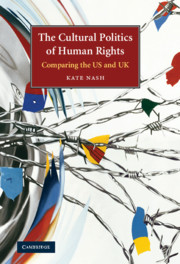Book contents
- Frontmatter
- Contents
- Preface
- List of acronyms used in the book
- Table of cases
- 1 What does it matter what human rights mean?
- 2 Analysing the intermestic human rights field
- 3 Sovereignty, pride and political life
- 4 Imagining a community without ‘enemies of all mankind’
- 5 Global solidarity: justice not charity
- 6 Conclusion
- References
- Index
1 - What does it matter what human rights mean?
Published online by Cambridge University Press: 27 June 2009
- Frontmatter
- Contents
- Preface
- List of acronyms used in the book
- Table of cases
- 1 What does it matter what human rights mean?
- 2 Analysing the intermestic human rights field
- 3 Sovereignty, pride and political life
- 4 Imagining a community without ‘enemies of all mankind’
- 5 Global solidarity: justice not charity
- 6 Conclusion
- References
- Index
Summary
The cultural politics of human rights disrupts taken-for-granted norms of national political life. Human rights activists imagine practical deconstruction of the distinction between citizens and non-citizens through which national states have been constituted. They envisage a world order of cosmopolitan states in which the rights of all would be fully respected. How likely is it that such a form of society might be realised through their activities? Is collective responsibility for human rights currently being shaped in cultural politics? If so, how, and with what consequences? If not, how is it that the vision of human rights activists is failing to take effect given the explosion of discourse on human rights in recent years?
A focus on what human rights mean to social and political actors, and on how these meanings impact on their institutionalisation, has been missing from the study of human rights. And yet it is only through cultural politics that the ideals of universal human rights may be realised in practice. What I mean by ‘cultural politics’ is more or less organised struggles over symbols that frame what issues, events or processes mean to social actors who are emotionally and intellectually invested in shared understandings of the world. But cultural politics is not only the contestation of symbols. Cultural politics concerns public contests over how society is imagined; how social relations are, could and should be organised.
- Type
- Chapter
- Information
- The Cultural Politics of Human RightsComparing the US and UK, pp. 1 - 29Publisher: Cambridge University PressPrint publication year: 2009



